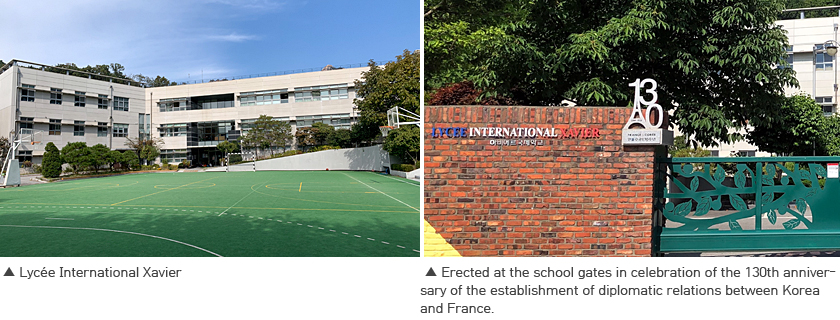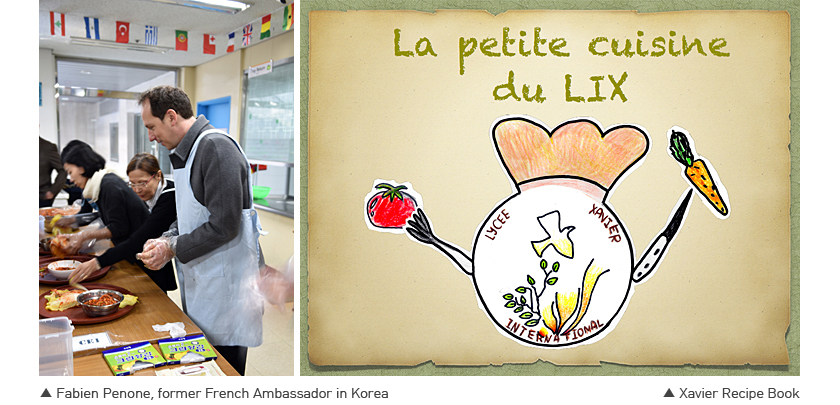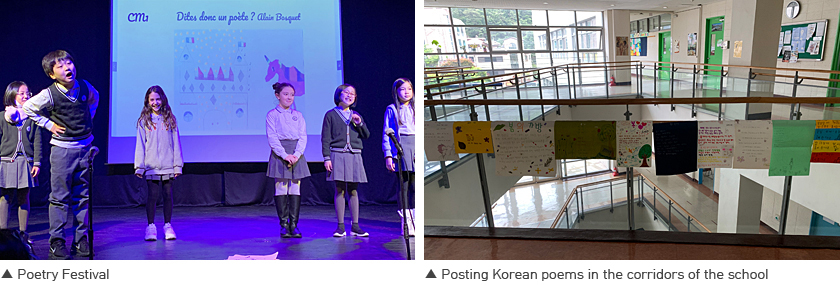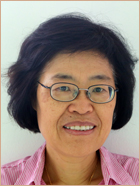Column
Korean Culture Exchange with Global Citizens
In this global era, we live as global citizens wherever we are. The Lycée International Xavier, a French international school in Korea, aims to teach the next generation to learn about and understand Korean culture correctly. The school's curricula for preschool, elementary, middle and high school programs follow the official curricula of the French Ministry of National Education. In addition, according to the educational belief of the school's French founder and first principal, LEBRUN Hélène, the school teaches Korean language and Korean history as regular subjects for both Korean and foreign students. It was based on the idea that these classes will help Korean students to establish their own cultural identity, while they will help foreign students to know the language of the country where they live and understand its culture through the language, which is the basic element of global citizenship within a pluralistic culture. Thus, students from preschool to the final year of high school learn the Korean language. As Korean is included in the baccalaureate, a French national academic qualification, if a student wants to study under the French school system and continue to learn the Korean language, he or she can take Korean language classes anywhere in the world. In recent years, students have taken the Test of Proficiency in Korean and the Korean language test in the baccalaureate among foreign exchange students, who have been attending our school for a long time. Our school, which is part of the life where multinational teachers from fifteen countries and children from multicultural families coexist, is a venue for exchanging cultures by understanding each other and seeing beyond cultural conflicts.

The unveiling ceremony of the sculpture was held at the school gates and attended by the French ambassador to celebrate the 130th anniversary of the establishment of diplomatic relations between Korea and France in 2016. The sculpture represents the special encounter between France and Korea by embodying the Eiffel Tower and the roof line of the traditional Korean house, or hanok. During the anniversary festival, the school held various events including Korean and French games, and a cooking competition of Korean and French foods. We also collected the recipes sampled from the food competition and published a cookbook. This cultural and historical event was a unique exchange of each country's unique cultural values and cultural abundance, rather than a competition between two cultures.

The Lycée International Xavier's elementary, middle and high schools hold a variety of learning and cultural events to facilitate exchanges in daily school life. Elementary school holds the annual Poetry Festival, as the study of poetry is considered a pillar of French education. During the festival, students recite not only French poems but also Korean ones. The walls of the corridors at the school become a permanent exhibition hall displaying French and Korean poems all year round to help students familiarize themselves with poetry in their daily school life. Meanwhile, on Hanbok Day, the students have an opportunity to learn about and wear traditional Korean clothes. Every May, the school runs the Intergenerational Exchange Learning Program, in which multinational children make a bow to invited local seniors, talk with them, do origami, sing the songs "Arirang," and "Spring in My Hometown" together, and share crepes made by students. This exchange learning program was conducted by inviting seniors to the school, but before the COVID-19 pandemic, students visited the seniors' houses and chatted with them, too. In addition, as part of our cultural exchange activities with a neighboring Korean school (Segumjung Elementary School), our students experienced some typical Korean educational activities such as speaking in Korean and playing traditional Korean games.


Furthermore, during the year-end festival, audiences were thrilled by performances of the seoljanggu (double-headed traditional Korean drum), samulnori (Korean percussion music), and Korean folk tales (The Piety of the Tiger, The Rabbit's Wise Judgment, etc.) organized by Korean language teachers. During the school festival in 2020, a Korean language teacher conducted a traditional Korean mask performance while observing the social distancing rules. Although it wasn't easy for students to wear a traditional mask on top of a mask, they were willing to accept it and gave the audience a wonderful heart-felt performance characterized by rather restrained movements.
The Gwanghwamun Arirang installation artwork was made on the theme of Overcoming War and Connecting Peace organized by the Ministry of Patriots and Veterans Affairs in June 15, 2020, commemorating the 70th anniversary of the Korean War. A number of our students contributed their sculptural works to this special exhibition, forming a giant mosaic of hope together with artworks by other children and young people from around the country. It was a great opportunity for our youth to realize the importance of "remembering and protecting" peace on a daily basis, as well as to refresh their view of the history while learn about the tragedy of war.
In this respect, we believe that our Korean history class will play a part in teaching our students a correct view of history. Our students take the Korean history class as a regular class for four years from the second year of middle school (the first year of Korean middle school) to the first year of high school. Thanks to this, there was an occasion when one Korean student of our school introduced the Modern History of Korea speaking in French to French teachers from the French sisterhood school (Centres Madeleine Daniélou), who visited Korea in 2014. They were impressed by it and said, "I wish there was a student like you in our country……" Sometimes, both Korean students who have stayed abroad for a long time, and foreign students, find the study of Korean history difficult. As they have already studied the history of their parents' country for many years, they seem to become gradually confident about the subject. Some of these students formed a history club together with their Korean history teacher, and regularly visited historical sites and discovered the pleasure of Korean culture and history. Although this club's activities have since been stopped, some Mugunghwa trees (Rose of Sharon, the national flower of South Korea) planted by the club students are still flourishing in the school grounds. Our students in the Korean history class will rise to yet another challenge and broaden their horizons by voluntarily taking part in the Golden Bell quiz competition organized by the National Unification Advisory Council and the Jongno-gu Council on May 26, 2021.
The whole class in the first year of high school takes part in the annual school play. In 2017, students gave a performance of "Ondal the Fool and Princess Pyeonggang" in Korean and French, which was reinterpreted by our French literature teacher, who was inspired by the Korean folk tale of the same name. I still vividly remember the thoughts of the students who played the roles of Ondal and the Princess. They said that: "From the perspective of contemporary Korean society, which only values studying, there is no place for Ondal. However, contrary to common belief, Ondal is extremely devoted to his mother. I feel that we should focus on people's inner side, rather than judging people only by their appearance," and "Unlike Ondal, who always smiles, the Princess is a very thoughtful person. But she often cries as well. She helps Ondal to become confident. I was impressed by the fact that they established their relationship by considering and compensating each other's weak points. It was a great performance that allowed us to rediscover the Hongikingan spirit of 'broad benefits for humanity', and encouraged people, who have forgotten how to praise other people's hidden value because they are so used to comparing themselves with others and judging people only by their appearance."
We often find ourselves living like a real Korean when we are among foreigners. If we understand this spirit and make it common practice in our daily life, we will be able to overcome conflicts arising from cultural differences and improve our own cultural identity. Culture is not only a collective expression but also, above all, 'Ye' (禮, propriety), which is an expression of personal 'In' (仁, benevolence) and 'Ui' (義, justice). We aim to help our students respect other people and their culture with an open mind toward the world at the Lycée International Xavier.
The Gwanghwamun Arirang installation artwork was made on the theme of Overcoming War and Connecting Peace organized by the Ministry of Patriots and Veterans Affairs in June 15, 2020, commemorating the 70th anniversary of the Korean War. A number of our students contributed their sculptural works to this special exhibition, forming a giant mosaic of hope together with artworks by other children and young people from around the country. It was a great opportunity for our youth to realize the importance of "remembering and protecting" peace on a daily basis, as well as to refresh their view of the history while learn about the tragedy of war.
In this respect, we believe that our Korean history class will play a part in teaching our students a correct view of history. Our students take the Korean history class as a regular class for four years from the second year of middle school (the first year of Korean middle school) to the first year of high school. Thanks to this, there was an occasion when one Korean student of our school introduced the Modern History of Korea speaking in French to French teachers from the French sisterhood school (Centres Madeleine Daniélou), who visited Korea in 2014. They were impressed by it and said, "I wish there was a student like you in our country……" Sometimes, both Korean students who have stayed abroad for a long time, and foreign students, find the study of Korean history difficult. As they have already studied the history of their parents' country for many years, they seem to become gradually confident about the subject. Some of these students formed a history club together with their Korean history teacher, and regularly visited historical sites and discovered the pleasure of Korean culture and history. Although this club's activities have since been stopped, some Mugunghwa trees (Rose of Sharon, the national flower of South Korea) planted by the club students are still flourishing in the school grounds. Our students in the Korean history class will rise to yet another challenge and broaden their horizons by voluntarily taking part in the Golden Bell quiz competition organized by the National Unification Advisory Council and the Jongno-gu Council on May 26, 2021.
The whole class in the first year of high school takes part in the annual school play. In 2017, students gave a performance of "Ondal the Fool and Princess Pyeonggang" in Korean and French, which was reinterpreted by our French literature teacher, who was inspired by the Korean folk tale of the same name. I still vividly remember the thoughts of the students who played the roles of Ondal and the Princess. They said that: "From the perspective of contemporary Korean society, which only values studying, there is no place for Ondal. However, contrary to common belief, Ondal is extremely devoted to his mother. I feel that we should focus on people's inner side, rather than judging people only by their appearance," and "Unlike Ondal, who always smiles, the Princess is a very thoughtful person. But she often cries as well. She helps Ondal to become confident. I was impressed by the fact that they established their relationship by considering and compensating each other's weak points. It was a great performance that allowed us to rediscover the Hongikingan spirit of 'broad benefits for humanity', and encouraged people, who have forgotten how to praise other people's hidden value because they are so used to comparing themselves with others and judging people only by their appearance."
We often find ourselves living like a real Korean when we are among foreigners. If we understand this spirit and make it common practice in our daily life, we will be able to overcome conflicts arising from cultural differences and improve our own cultural identity. Culture is not only a collective expression but also, above all, 'Ye' (禮, propriety), which is an expression of personal 'In' (仁, benevolence) and 'Ui' (義, justice). We aim to help our students respect other people and their culture with an open mind toward the world at the Lycée International Xavier.


